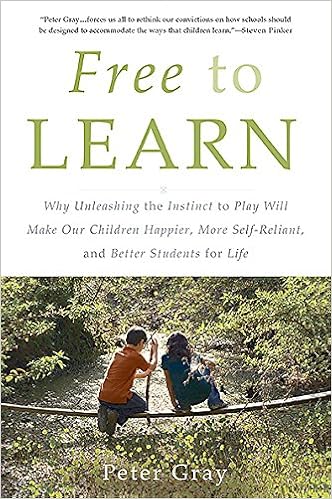Free to Learn by Peter Gray
Chapter 6 - The Human Educative Instincts
Peter Gray writes: "Today when most people think of education they think of schooling. In other words, they think of education as something done to children by adults." I would tend to agree. Gray writes about three innate aspects or instinctive drives within us that can serve education.
Curiosity - the drive to explore, understand, find out about the world around us. From earliest ages, children are intently interested in things they have not seen or experienced before, more than what they have seen or experienced already. As they grow, children are interested in exploring beyond what is known, not just replicating past experiences. If an adult explains how to use a toy, a child will explore it less and not discover much beyond what he was shown. If an adult just plays with the toy randomly and then gives it to the child or just gives it to the child without doing anything, children will explore the toy longer and discover more about its attributes. "Teaching" inhibits curiosity about the toy. Less direct instruction can yield more learning, deeper learning.
Playfulness - the drive to practice and create, to repeat new skills and use them in creative ways. Curiosity is focused on discovery. Playfulness is purposeful action to produce known result or using something in a different but purposeful way. Peter Gray lists several different types of universal play. (These types overlap and are not distinct categories.)
- Physical play - using bodies in coordinated movements (running, wrestling, chasing)
- Language play - learning to talk and use language to communicate (babbling, puns, rhymes)
- Exploratory play - refining exploring skills (making sense of the world, science)
- Constructive play - producing something that is in the mind (drawing, building)
- Fantasy play - create and operate within an imaginary world (pretending, thinking logically)
- Social play - cooperating and restraining impulses (playing games, negotiating)
All children play in these ways. Specifics of play vary from culture to culture.
Sociability - drive to share information and ideas, telling and teaching others what we know.
Children will naturally show others what they have learned. They will help other children discover how things work. Children learn more together than alone. Groups can generate more ideas and pool their knowledge to have greater understanding. Language is a key component to social learning.
Gray writes that schools thwart these natural instincts of children. They do not allow children to explore what they are interested in or make many choices related to what and how to learn/explore. Schools tend to focus on "one right answer" over finding ways to solve problems. Schools stress evaluation and assessment. Included in this chapter is a quote from a teacher; when students began to exploring items in a way different from what she had planned, she said, "Kids, I'll give you time to experiment at recess. Now it's time for science." (In other words, do things my way and explore on your own time.)
I think there's a lot of meat in this chapter regarding these three instincts. Peter Gray broadens the discussion of these three in the next chapters. But I think the note that adults and schools often thwart the natural ways kids learn is an important point. And I think the focus on standards can also tie the hands of educators who want to encourage exploration. The question I come back to is this: Are we derailing learning--true deep understanding and mastery--for education (performing well on tests and parroting back established formulas)?



